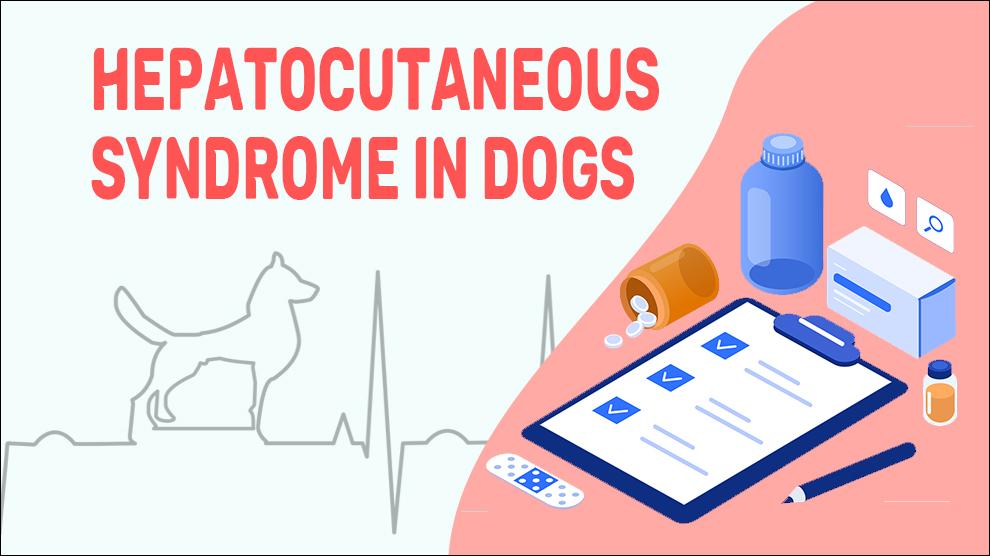What Is Hepatocutaneous Syndrome In Dogs?
Hepatocutaneous Syndrome is used to describe a chronic, progressive, heterogeneous group of skin diseases that are caused by metabolic abnormalities (maybe because of a dietary discrepancy) due to severe liver dysfunction. This disease is also called superficial necrolytic dermatitis (SND) and necrolytic migratory erythema (NME).
The pathophysiology is rather poorly understood. While hepatocutaneous syndrome is also linked to diabetes mellitus, the disease may also be connected to a neuroendocrine or pancreatic tumor. In the case of liver disease, there may be increased catabolism of amino acids whereas, in pancreatic neoplasia, hyperglucagonaemia causes increased gluconeogenesis. In both cases, the outcome is lower plasma amino acid concentrations and epidermal protein depletion, which is considered to be the cause of skin lesions.
Hepatocutaneous syndrome is most often seen in middle to older dogs. Skin lesions are the initial and most prevalent noticeable sign of Hepatocutaneous Syndrome. They often manifest even before lesions on the liver get formed.
The clinical signs include crusting of the perineal, perioral, periocular areas, and footpads. The course of the disease might be progressive with either slow (within months or years) or a rapid (within days or weeks) onset of clinical signs, or it may fluctuate with waves of pustule formation.
Symptoms Of Hepatocutaneous Syndrome In Dogs
Treatment Options For Hepatocutaneous Syndrome In Dogs
- Immediate hospitalization and close monitoring are required for liver dysfunction, if not treated immediately, will cause death.
- Intravenous fluid and nutritional therapy will be given to help your dog not become severely dehydrated.
- Immunosuppressive or anti-inflammatory medications.
- Anti-diarrhea medications.
- A broad-spectrum antibiotic for any secondary bacterial infections from occurring.
- Chronic liver failure in dogs - treatment protocol focuses on slowing the disease progression, and severity and improving the quality of life for the pet.
- Surgery may be required to treat liver or pancreatic cancer.
- Congenital abnormalities such as enzyme and protein abnormalities need long-term medications.
- When equilibrium is achieved, medications can be tapered gradually and the focus of treatment is shifted to the continuance of the equilibrium state and control of inflammation. However, in most cases, autoimmune disease treatment is done on an outpatient basis.
Home Remedies For Hepatocutaneous Syndrome In Dogs
- Weekly or fortnightly medicated baths with antifungal / antimicrobial agents alleviate irritated skin and get rid of allergens that flares-up skin allergies. Afterward, rinse off the dog to avoid drying out the hair coat and skin.
- Clean the Dogs’ skin folds daily with a clean washcloth using shampoo or wipes or skin cleanser.
- Regular brushing of the dog reduces shedding and spreads the skin’s sebum across the body.
Prevention Of Hepatocutaneous Syndrome In Dogs
- There are no known ways of preventing Hepatocutaneous
- Mark your calendar for regular vet visits and check for metabolic diseases.
- Provide a home-prepared diet of grass-fed, organic meat or holistic ingredients.
- Once the target is achieved, the prescribed dosage for your dog should be tapered off gradually, or else you might experience allergic reactions or withdrawal symptoms.
Affected Dog Breeds Of Hepatocutaneous Syndrome
Miniature Poodle, Lhasa Apso, Cocker Spaniel, Senior Dogs. There is no breed predisposition.
Additional Facts For Hepatocutaneous Syndrome In Dogs
- Causes:
- Congenital / Idiopathic.
- Liver or a pancreatic tumor.
- Endocrine Diseases: Diabetes, Cushing's Disease, Hyperthyroidism.
- Canine Hepatitis, Cholangiohepatitis, Autoimmune Hepatitis.
- Congenital abnormalities - Hepatic amyloidosis, glycogen storage disease, liver shunt.
- Mortality:
Hepatocutaneous syndrome is a potentially fatal disease in dogs and the median survival time in affected dogs is < 6 months.
- Diagnosis:
- Urinalysis / Routine hematology.
- Histopathological examination of the skin.
- Surgical biopsy
- Fungal culture
- Bacterial culture
- Differential Diagnosis:
- Pemphigus foliaceus
- Pemphigus Vulgaris
- Acantholytic Actinic Keratosis
- Systemic Lupus Erythematosus
- Cutaneous Epitheliotropic Lymphoma
- Pedal pyoderma with an underlying cause (dermatophytosis, demodicosis).
- Drug Eruption
- Zinc-responsive Dermatosis
- Prognosis:
The prognosis varies ranging from fair to guarded depending on the cause and any underlying condition. Dogs that have suffered from only a single episode of Hepatocutaneous syndrome have an excellent prognosis, meanwhile, the lesions tend to relapse after treatment in genetically predisposed dogs.
When To See A Vet For Hepatocutaneous Syndrome In Dogs?
Time to get the vet intervention, if you notice any of the following:
- Skin erosions and crusts, sometimes itchy.
- Superficial, small, and transient pustules.
- Lesions can coalesce or cluster to form different patterns.
Food Suggestions For Hepatocutaneous Syndrome In Dogs
- Choose a wholesome food, minimally-processed, that is free of preservatives, chemicals, hormones, and other toxic additives.
- Consider a diet with all essential nutrients and also provides plenty of antioxidants (combat free radicals).
- Protein (moderate levels of bioavailable protein).
- Omega fats (omega-6 and omega-3 in a 4:1 ratio) and antioxidants.
- Lean meats or meat alternatives: chicken breast, ground meat (beef, pork, chicken, turkey), Salmon, trout, herring, etc.
Conclusion
Overall, Most cases of hepatocutaneous conditions can be satisfactorily treated. This is usually a lifelong condition only in genetically predisposed dogs, requiring continuous management.
There is no evidence to support the recurrence of hepatocutaneous syndrome. However, always follow the progress with regular checkups and keep an eye on any appearance of symptoms you noticed in the past.

















